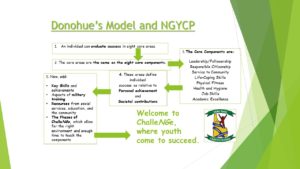See the information below about the training the IDYCA youth will receive while attending the Academy:
1. The 8 Core Components:
Following are the details of the 8 Core Components, the one-of-a-kind holistic training provided at all Youth ChalleNGe Programs nationwide:
- Leadership/Followership. Identification and application of individual moral and ethical standards is the focus of the various roles and responsibilities as the cadets live and learn in a structured group environment.
- Responsible Citizenship. The U.S. Government structure and processes, along with individual rights and responsibilities at the local, state and national level are addressed in the classroom environment, in the student government process, and through practical experiences within local communities.
- Service to Community. A minimum of 40 hours of service to the community and/or conservation project activities are performed by each cadet in groups and on an individual basis. These activities provide additional opportunities for career exploration as well as enhancing
 community-needs awareness in cadets.
community-needs awareness in cadets. - Life-Coping Skills. Increased self-esteem and self-discipline are gained through a combination of classroom activities and a structured living environment.The development of individual strategies and coping mechanisms for managing personal finance and dealing with such emotions as anger, grief, frustration and stress are developed through structured group discussion and in the classroom environment.
- Physical Fitness. Programs conduct a physical fitness program using the President’s Challenge, a test battery based on data collected from a variety of sources including the 1985 President’s Council on Physical Fitness and Sports National School Population Fitness Survey, the Amateur Athletic Union Physical Fitness Program and the Canada Fitness Award Program.
- Health and Hygiene. A holistic approach that combines physical and mental well-being as cadets explore the effects of substance abuse and sexually transmitted diseases on their physical health and well-being. Cadets learn the physical and emotional benefits of proper nutrition through participation in classes and structured group discussions.
- Job Skills. Career exploration is accomplished through career assessment and interest inventories, job-specific skills orientation and awareness, and training in area vocational centers. Specific classroom activities focus on development of individual resumes, completing job applications and preparation for, and conduct of job interviews.
- Academic Excellence. IDYCA is a fully accredited Idaho Alternative High School, through Cognia. All ChalleNGe participants attend daily academic classes taught by certified High School teachers, who are contracted through through the local Joint School District #171. These classes offer our youth the opportunity to increase their aptitude in a variety of subjects, especially math and reading. Eligible students may also find time to work on their senior projects, engage in formal tutoring of their peers, or prepare for testing for the General Education Development (GED) credential. Evaluation of a cadet’s grade level progress during the Residential Phase is measured using the Tests of Adult Basic Education (TABE) testing process.
3. IDYCA Academic Core Courses:
Download our Complete Class Descriptions
| State Course Codes | Course Description | Teacher Name | Credits Possible |
| 01051, 01052 | English Literature, Composition and Proficiency Development | K. Ubil | 2 |
| 02061 | Integrated Algebra / Geometry | M. Brocke | 2 |
| 03003, 03201 | Integrated Science / Environmental Science with Lab; Forestry / Biology | J. Wickard | 2 |
| 04101 | U.S. History | J. Kelley | 1 |
| 04151 | American Government | J. Kelley | 1 |
| 20005 | Economics | J. Kelley / H. Kelley / A. Anderson | 1 |
| 01151 | Speech | K. Ubil / J. Hill | 1 |
| 22004 | Dropout Prevention | H. Kelley / A. Anderson | 0 |
| 20005 | Career Choices | J. Hill / K. Bethel | 1 |
| 08051 | Health, Nutrition and Wellness | J. Hill / A. Saltarelli | 1 |
| 08001 | Fitness and Conditioning | J. Hill | 2 |
| 4310 | Humanities | K. Ubil / A. Saltarelli | 1 |
3. Typical Weekday Schedule – Residential Phase Daily Activities:
- 0500: Wake-up/Accountability/Hygiene
- 0530: Morning Cleanup
- 0600: Chow Rotation (20 min PT)
- 0740: Colors
- 0740: Formation
- 0755: School
- 1205: Chow Rotation
- 1250: School
- 1615: PT
- 1630: TL Time/Recovery
- 1800: Chow Rotation
- 1900: Formation/Colors
- 1910: TL Time
- 1930: Hygiene
- 2030: Journal Entry/Relaxation
- 2050: Mount/Quiet Time
- 2100: Lights Out
